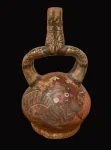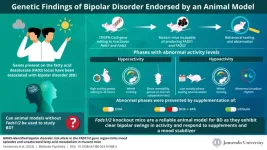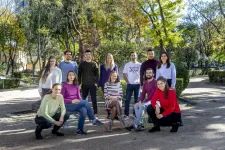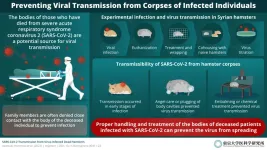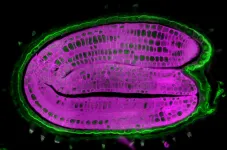(Press-News.org) Will AI drive the next biomedical revolution? Why is RNA so powerful? What can we learn from studying bias? You’ll get the answers to these questions and more at Discover BMB, the annual meeting of the American Society for Biochemistry and Molecular Biology, to be held March 25–28 in Seattle.
Reporters are invited to register for a complimentary press pass to attend #DiscoverBMB in Seattle or to access press materials electronically.
This year’s #DiscoverBMB program features leading experts discussing their newest discoveries and cutting-edge approaches in biochemistry and molecular biology.
Hot topics include:
Advanced computing takes center stage
Artificial intelligence and simulation are helping biologists achieve insights that aren’t possible with experimentation alone. Meanwhile, machine learning and other computing strategies are accelerating drug design and development. This session will highlight the many ways that computational methods are transforming biological problem-solving. Learn more.
RNA and its regulation
If there were a “Biomolecule of the Year” award, RNA would have won for a few years running. From a pandemic caused by an RNA virus to the development of multiple RNA vaccines to defeat it, the importance of RNA is clear. This session will zero in on RNA regulation with expert talks covering RNA binding proteins and disease, RNA modifications and novel RNAs. Learn more.
Carbohydrates in health and disease
Carbohydrates perform key functions in many biological processes. Although studying carbohydrates in detail was once a daunting task, technological advances are making it much easier. This session will cover new tools for studying these indispensable biomolecules and the latest insights into carbohydrates in health and disease. Learn more.
Putting the spotlight on cell organelles
Once thought of as mere compartments within the cell, cellular organelles, scientists now know, play key roles in fine-tuning metabolism, signaling and quality control. This session will feature new work showing how organelles sense and respond to cues and protect cells from stress. Learn more.
Hidden biases of good people
Featuring Mahzarin Banaji, Ph.D., of Harvard University, this session will reveal the surprising and even perplexing ways people make errors in assessing and evaluating others. Banaji’s pioneering research on implicit bias suggests that people intend well but that a lack of awareness can lead to inconsistencies between a person’s values and behavior. Learn more.
View all the sessions and see who will be speaking: https://discoverbmb.asbmb.org/program/sessions-speakers.
Follow #DiscoverBMB on Facebook, Twitter, Instagram and LinkedIn.
Contact:
Anne Johnson
(571) 271-1986 (mobile)
media@asbmb.org
About the American Society for Biochemistry and Molecular Biology (ASBMB)
The ASBMB is a nonprofit scientific and educational organization with more than 12,000 members worldwide. Founded in 1906 to advance the science of biochemistry and molecular biology, the society publishes three peer-reviewed journals, advocates for funding of basic research and education, supports science education at all levels, and promotes the diversity of individuals entering the scientific workforce. www.asbmb.org
END
Join us at #DiscoverBMB 2023 for the latest molecular life sciences research
Get your press pass today for the American Society for Biochemistry and Molecular Biology annual meeting March 25–28 in Seattle
2023-03-07
ELSE PRESS RELEASES FROM THIS DATE:
The colors on these ancient pots hint at the power of an empire
2023-03-07
Color plays a huge role in our lives — the hues we wear and decorate with are a way for us to signal who we are, where we’re from, and what we care about. And it’s been that way for a long time. In a new study in the Journal of Archaeological Science: Reports, archaeologists compared the colors on pieces of ancient Peruvian pottery. They found that potters across the Wari empire all used the same rich black pigment to make ceramics used in rituals: a sign of the empire’s influence.
The Wari empire spread over Peru’s highlands and coastal areas from 600-1050 ...
Does current shellfish anti-predator gear curb ‘crunching’ rays?
2023-03-07
According to NOAA Fisheries, more than 80 percent of marine aquaculture production in the United States consists of bivalve mollusks such as oysters, clams and mussels. However, it’s not just humans who enjoy eating these shellfish, so do marine rays. They like to “crunch” on clams, which can sometimes take a big bite out of clammers’ profits.
Part of the process of culturing hard clams (Mercenaria mercenaria) involves deploying them in submerged bottom leases in the marine environment where clams can grow to market size. When deployed onto the clam lease, clammers incorporate a variety of anti-predator ...
Understanding what makes senior towns in Iowa “smart”
2023-03-07
AMES, IA — With the youngest baby boomers sliding into retirement, adults aged 65 and older are expected to outnumber children by 2030. The demographic shift will be a first in U.S. history. But many rural areas, especially in the Midwest and Great Plains, are already experiencing this.
Researchers are looking to small towns in Iowa to understand how some support aging in place better than others. Their findings, published in Journal of Rural Studies, could help communities plan for the ...
Researchers create mutant mice to study bipolar disorder
2023-03-07
Bipolar disorder (BD) is a debilitating condition characterized by alternating states of depression (known as depressive episodes) and abnormal excitement or irritability (known as manic episodes). Large-scale genome-wide association studies (GWASs) have revealed that variations in the genes present on the fatty acid desaturase (FADS) locus are linked to an increased risk of BD. Enzymes coded by FADS genes—FADS1 and FADS2—convert or "biosynthesize" omega-3 fatty acids into the different forms required by the human body. Omega-3 fatty acids like ...
New breakthrough enables perfectly secure digital communications
2023-03-07
Researchers have achieved a breakthrough to enable ‘perfectly secure’ hidden communications for the first time.
The method uses new advances in information theory methods to conceal one piece of content inside another in a way that cannot be detected.
This may have strong implications for information security, besides further applications in data compression and storage.
A group of researchers has achieved a breakthrough in secure communications by developing an algorithm that conceals sensitive information so effectively that it is impossible to detect that anything has been hidden.
The team, led by ...
CNIO researchers propose biomarkers to select breast cancer patients who could benefit from denosumab treatment
2023-03-07
The study supports the therapeutic benefit of this drug in postmenopausal patients with hormone-receptor negative breast tumours and RANK protein expression.
"These results revive the option of starting clinical trials of denosumab in breast cancer by selecting patients," says Eva González-Suarez, CNIO researcher and lead author.
The results are published today in the scientific journal EMBO Molecular Medicine.
The drug denosumab is currently used to treat osteoporosis and bone metastases. For more than a decade, its potential therapeutic benefit in the treatment of breast cancer has also been studied. However, due to conflicting clinical ...
The planet that could end life on Earth
2023-03-07
A terrestrial planet hovering between Mars and Jupiter would be able to push Earth out of the solar system and wipe out life on this planet, according to a UC Riverside experiment.
UCR astrophysicist Stephen Kane explained that his experiment was meant to address two notable gaps in planetary science.
The first is the gap in our solar system between the size of terrestrial and giant gas planets. The largest terrestrial planet is Earth, and the smallest gas giant is Neptune, which is four times wider and 17 times more massive than Earth. There is nothing in between.
“In other star ...
Scientists suggest guidelines to prevent SARS-CoV-2 transmission from deceased individuals
2023-03-07
Their findings highlight that embalming or "angel care" can effectively prevent virus transmission, to allow family members to say goodbye
During the pandemic, COVID-19 control measures in several countries prevented family members from coming into contact with loved ones who died from the infection. This had an impact on cremation practices and caused emotional distress. Researchers from Japan have now shown that, while deceased SARS-CoV-2-infected individuals may be a potential source of the ...
An internal thermometer tells the seeds when to germinate
2023-03-07
Germination is a crucial stage in the life of a plant as it will leave the stage of seed resistant to various environmental constraints (climatic conditions, absence of nutritive elements, etc.) to become a seedling much more vulnerable. The survival of the young plant depends on the timing of this transition. It is therefore essential that this stage be finely controlled. A Swiss team, led by scientists from the University of Geneva (UNIGE), has discovered the internal thermometer of seeds that can delay or even block germination if temperatures are too high for the future seedling. This work could help optimize plant growth in a context of global warming. These results can be ...
Study reveals limitations in evaluating gene editing technology in human embryos
2023-03-07
A commonly used scientific method to analyze a tiny amount of DNA in early human embryos fails to accurately reflect gene edits, according to new research led by scientists at Oregon Health & Science University.
The study, published today in the journal Nature Communications, involved sequencing the genomes of early human embryos that had undergone genome editing using the gene-editing tool CRISPR. The work calls into question the accuracy of a DNA-reading procedure that relies on amplifying a small amount of DNA for purposes of genetic testing.
In addition, the study reveals that gene editing to correct disease-causing mutations in early human embryos can also lead to unintended ...
LAST 30 PRESS RELEASES:
PhD student maps mysterious upper atmosphere of Uranus for the first time
Idaho National Laboratory to accelerate nuclear energy deployment with NVIDIA AI through the Genesis Mission
Blood test could help guide treatment decisions in germ cell tumors
New ‘scimitar-crested’ Spinosaurus species discovered in the central Sahara
“Cyborg” pancreatic organoids can monitor the maturation of islet cells
Technique to extract concepts from AI models can help steer and monitor model outputs
Study clarifies the cancer genome in domestic cats
Crested Spinosaurus fossil was aquatic, but lived 1,000 kilometers from the Tethys Sea
MULTI-evolve: Rapid evolution of complex multi-mutant proteins
A new method to steer AI output uncovers vulnerabilities and potential improvements
Why some objects in space look like snowmen
Flickering glacial climate may have shaped early human evolution
First AHA/ACC acute pulmonary embolism guideline: prompt diagnosis and treatment are key
Could “cyborg” transplants replace pancreatic tissue damaged by diabetes?
Hearing a molecule’s solo performance
Justice after trauma? Race, red tape keep sexual assault victims from compensation
Columbia researchers awarded ARPA-H funding to speed diagnosis of lymphatic disorders
James R. Downing, MD, to step down as president and CEO of St. Jude Children’s Research Hospital in late 2026
A remote-controlled CAR-T for safer immunotherapy
UT College of Veterinary Medicine dean elected Fellow of the American Academy of Microbiology
AERA selects 34 exemplary scholars as 2026 Fellows
Similar kinases play distinct roles in the brain
New research takes first step toward advance warnings of space weather
Scientists unlock a massive new ‘color palette’ for biomedical research by synthesizing non-natural amino acids
Brain cells drive endurance gains after exercise
Same-day hospital discharge is safe in selected patients after TAVI
Why do people living at high altitudes have better glucose control? The answer was in plain sight
Red blood cells soak up sugar at high altitude, protecting against diabetes
A new electrolyte points to stronger, safer batteries
Environment: Atmospheric pollution directly linked to rocket re-entry
[Press-News.org] Join us at #DiscoverBMB 2023 for the latest molecular life sciences researchGet your press pass today for the American Society for Biochemistry and Molecular Biology annual meeting March 25–28 in Seattle
